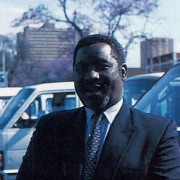Paradise Gained
One of South Africa’s most vital industries is also its most hazardous. The mini-bus taxi industry provides public transport to a majority of South Africans and purchases vehicles, fuel and components in large volumes. But it is also in a state of chaos. Wessel Ebersohn reports on attempts to bring order to the industry.
The organisation at the centre of South Africa’s most volatile industry has a new leader who is determined, as he puts it, “to sort out the mess”. Paradise Mahlangu, the man who has taken over the reins as president of the Southern African Black Taxi Association (Sabta), faces a task of formidable dimensions. The association is all but bankrupt and the level of violence in the industry is frighteningly high. Attacks and counter-attacks between rival groups, resulting from severely overtraded conditions, while not as frequent as in 1993, had nevertheless resulted in 80 deaths by October. In one attack in the Western Cape 33 people were gunned down, of whom 10 died.
Police picked up 162 bullet cases at the scene. Even policemen investigating the killings risk their lives. A warrant officer was shot at point-blank range in his home by two men posing as carburettor salesmen and died instantly. The difficulties of brokering peace between rival groups have been complicated by the emergence of an assassination industry that now co-exists with the taxi industry. “When we tell people to stop fighting we are telling the hit man to close up shop,” says Mahlangu. ‘This is how he earns his living. He does not want us putting him out of business.” In June 1994 two drivers who defected from the South African Long Distance Taxi Association had warned that shootings in some Johannesburg ranks were caused by “mafia style” operations within that organisation. Despite its problems, the black taxi industry is of immense importance to the community from which it comes. It has been estimated that it is responsible for one quarter of the informal sector’s contribution to gross domestic product. Almost 50 per cent of all black commuters use taxis, more than double the number that use buses, the next most popular form of transport.
Within the communities they serve the taxis are commonly known as lola Budds because of their tendency to crash, the South African athlete of that name having been involved in a famous track collision in the Los Angeles Olympic Games. The industry started in the 1960s with ordinary sedans as the vehicles of choice. It was only in the late 1970s that the mini-buses that have since spread to most of Africa took over. Mahlangu’s career is almost a mirror of the industry’s growth. His first taxi in 1970 was an old Dodge Monaco. When the change to mini-buses came he went with the flow. In 1978 he was a founder member of the Pretoria United Taxi Association out of which Sabta grew.
An extraordinary young wheeler dealer by the name of James Chapman, at that stage running a filling station for his family, was brought in by Mahlangu as adviser. He set up a marketing company called Taxi SA Marketing (Taxsam) to run parallel with the association. Through Taxsam Chapman negotiated deals for finance and insurance, both of which had been almost completely unobtainable for taxi owners. He showed the taxi owners that their united buying strength gave them power in the market place. Chapman had resigned from Taxsam in 1992, but the return of Mahlangu has brought him back as well. As in the old days Mahlangu will be looking to him to lead Sabta out of the mire. With over 100 000 taxi operators in the country it is likely that more black South Africans have been empowered by this industry than any other. In recent years the buying power of the industry has led to the creation of other more formal black-owned enterprises. Future Bank originally went into operation to finance taxis, Afsure and African General Insurance to insure them… All agree that the primary cause of the violence is severe overtrading helped along by the deregulation policies of the old government. In the mid-l 980s, for example, the Pretoria City Council issued 300 permits for taxis in one year and 6000 the next. A 1986 letter from Sabta warning government that their policies would lead to chaos and disorder had been ignored. “At least now we have a government that is sympathetic,” says Mahlangu. “We will be working closely with them to sort out the mess.”
Mahlangu came to his position in a peculiarly African way. He had resigned as public relations officer of Sabta in mid-1994, disenchanted with the way the association was being full. A few months later a delegation of close to 100 taxi operators arrived at his home. “You must come back,” he was told. “We made you what you are. You have to be at our disposal.”
Wessel Ebersohn is a specialist writer on emergent business.
South Africa, The Journal of Trade, Industry and Investment
Publisher, David Altman
Writer, Wessel Ebersohn



